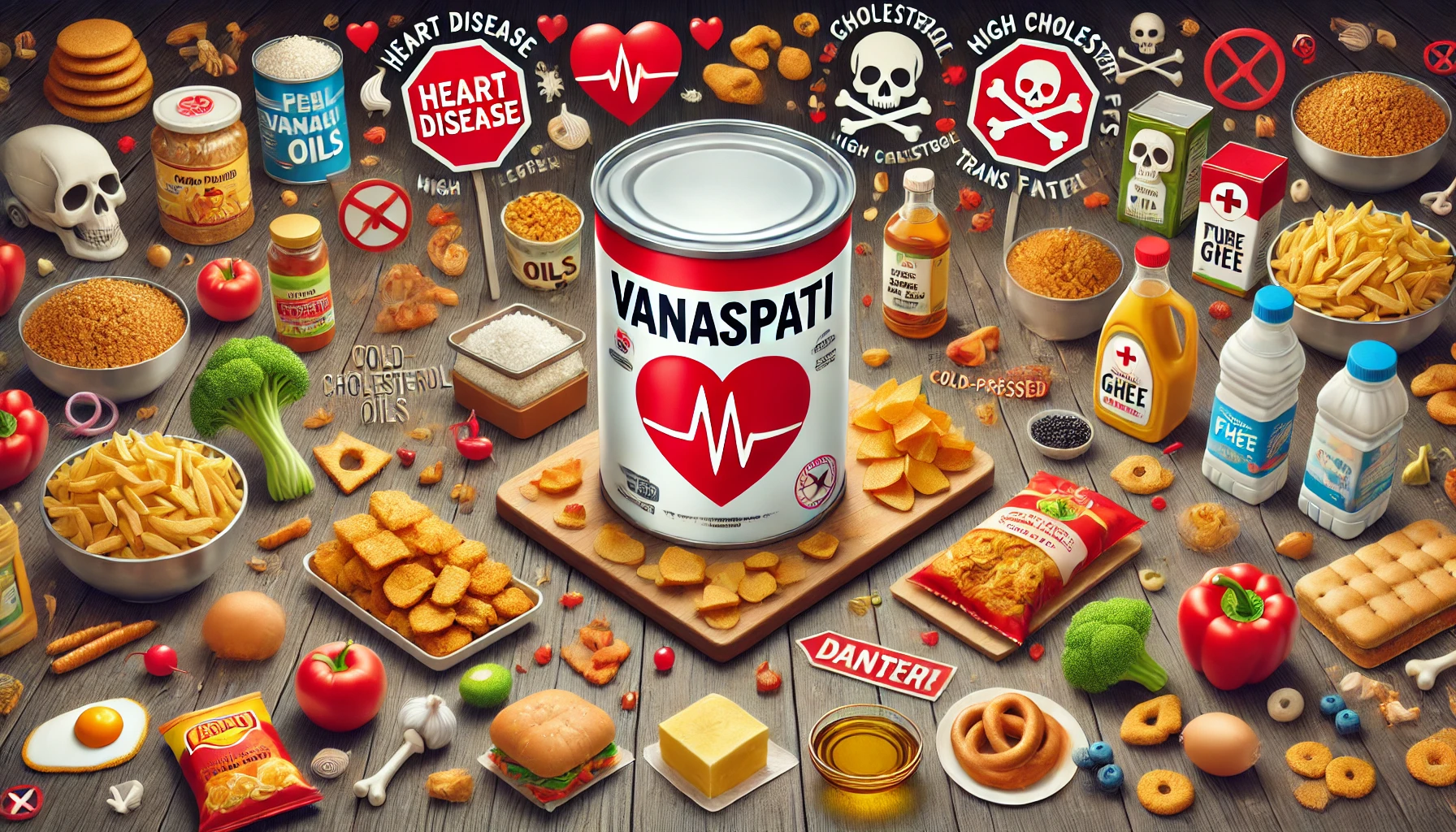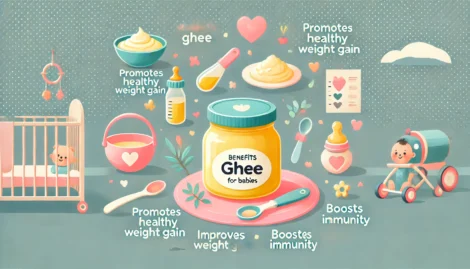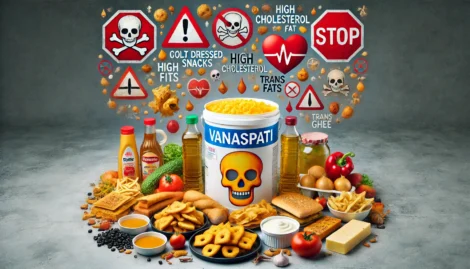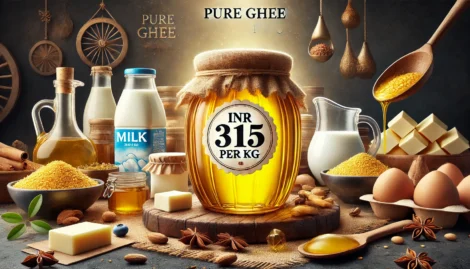- You have no items in your shopping cart
- Subtotal: ₹0.00
Health Hazards of Vanaspati Mixed with Ghee: Why You Should Avoid Adulterated Ghee
In India, ghee has been a staple ingredient in households for centuries, known for its rich flavor, health benefits, and cultural significance. However, due to the high cost of pure ghee, there has been a concerning rise in the use of vanaspati (also known as Dalda or hydrogenated vegetable oil) mixed with ghee, leading to widespread adulteration. This adulteration presents significant health risks, as vanaspati contains harmful trans fats and lacks the nutritional benefits of pure ghee.
In this blog post, we will explore the differences between ghee and vanaspati, the dangers of consuming adulterated ghee, and why it’s crucial to choose pure ghee for your diet. We will also examine scientific research, government regulations, and alternatives for those seeking healthier cooking options.
What Is Vanaspati?
Vanaspati, commonly referred to as Dalda, is a hydrogenated vegetable oil used as a cheaper alternative to ghee and butter. It is widely used in the food industry for deep frying, baking, and as a substitute for ghee in various recipes. However, the hydrogenation process, which turns liquid vegetable oil into solid fat, introduces trans fats into the product, making it unhealthy for consumption.
Unlike natural oils, which retain beneficial nutrients, vanaspati is highly processed and devoid of essential fatty acids, vitamins, and minerals. Despite its widespread use, vanaspati has been linked to numerous health problems, primarily due to its high trans fat content.
The Dangers of Adulterating Ghee with Vanaspati
Adulterating pure ghee with vanaspati may make it cheaper, but it significantly compromises its health benefits. Here’s why:
- Increased Trans Fats: Vanaspati is loaded with trans fats, which are known to raise bad cholesterol (LDL) levels and lower good cholesterol (HDL) levels. This increases the risk of heart disease, stroke, and other cardiovascular problems.
- Toxicity: The hydrogenation process used to make vanaspati involves chemicals like nickel, which can have toxic effects on the body when consumed regularly.
- Digestive Issues: Unlike pure ghee, which contains short- and medium-chain fatty acids that are easily digestible, vanaspati can cause indigestion, bloating, and other gastrointestinal issues.
- Impaired Nutrient Absorption: Vanaspati lacks the fat-soluble vitamins (A, D, E, and K) found in pure ghee. Consuming vanaspati may interfere with the body’s ability to absorb these essential nutrients, leading to deficiencies.
- Obesity and Weight Gain: The unhealthy fats in vanaspati are more likely to contribute to weight gain and obesity, as the body stores trans fats in fat tissues. In contrast, ghee can boost metabolism and support weight management when consumed in moderation.
- Increased Risk of Cancer: Studies have shown that regular consumption of trans fats, such as those found in vanaspati, may increase the risk of certain cancers, particularly breast and colon cancer.
Research on the Health Risks of Vanaspati
Numerous studies have highlighted the health risks associated with consuming vanaspati and other hydrogenated oils:
- Trans Fats and Heart Disease: A study published in the American Journal of Clinical Nutrition found that trans fats significantly increase the risk of coronary heart disease by raising LDL cholesterol and reducing HDL cholesterol.
- Toxicity of Hydrogenated Oils: Research conducted by the World Health Organization (WHO) has pointed out that the hydrogenation process used in making vanaspati introduces toxic by-products like nickel, which can accumulate in the body and lead to serious health issues.
- Impact on Digestion: A study from Nutrition & Metabolism demonstrated that consuming trans fats can impair digestion and lead to weight gain, especially around the abdominal area.
- Cancer Risk: A 2015 study published in the Journal of Clinical Oncology suggested a strong link between trans fat consumption and an increased risk of certain types of cancer, including breast and colon cancer.
Government Regulations and Adulteration
The Food Safety and Standards Authority of India (FSSAI) has implemented strict regulations on food adulteration, especially regarding ghee and vanaspati. According to FSSAI, ghee must contain a minimum of 99.7% fat, with no added adulterants like vanaspati or other oils.
However, despite these regulations, the practice of adulterating ghee with vanaspati remains a concern in many parts of India. Adulterated ghee can be sold at a lower price, making it more attractive to consumers, but it poses serious health risks.
Why Choose Pure Ghee?
When it comes to cooking and overall health, pure ghee is far superior to vanaspati. Here’s why:
- Nutritional Benefits: Pure ghee is rich in fat-soluble vitamins A, D, E, and K, which are essential for maintaining healthy skin, vision, bones, and the immune system.
- Better for Heart Health: Contrary to popular belief, moderate consumption of pure ghee has been shown to support heart health by increasing HDL cholesterol levels and promoting healthy blood circulation.
- High Smoke Point: Ghee has a high smoke point, making it ideal for cooking at high temperatures without breaking down into harmful compounds.
- Supports Digestion: The butyric acid in ghee helps promote a healthy gut by nourishing the intestinal cells and improving digestion.
- Natural and Unprocessed: Unlike vanaspati, which undergoes heavy processing, pure ghee is made using traditional methods like hand-churning or boiling, ensuring that it retains all of its natural goodness.
Alternatives to Vanaspati
For those seeking a healthier alternative to vanaspati, cold-pressed oils are an excellent option. Cold-pressed oils, like coconut oil, sesame oil, and olive oil, are extracted without heat or chemicals, ensuring that their nutrients and natural flavors are preserved. These oils are rich in antioxidants, vitamins, and healthy fats, making them a much safer and more nutritious choice for cooking.
Here are some healthy alternatives to vanaspati:
- Cold-Pressed Coconut Oil: Rich in medium-chain fatty acids, coconut oil is known for its numerous health benefits, including weight loss support, improved digestion, and better brain function.
- Cold-Pressed Sesame Oil: This oil is a staple in Indian cuisine and offers a rich source of antioxidants, as well as anti-inflammatory and heart-protective properties.
- Cold-Pressed Olive Oil: Known for its cardiovascular benefits, olive oil is rich in monounsaturated fats and polyphenols, which help reduce inflammation and improve heart health.
- Cold-Pressed Groundnut Oil: Groundnut oil, or peanut oil, is another great alternative for cooking, offering a high smoke point and a good balance of fatty acids.
GheeStore: Your Source for Authentic Ghee and Cold-Pressed Oils
At GheeStore, we pride ourselves on delivering 100% pure, unadulterated ghee and cold-pressed oils to our customers. Our products are made using traditional methods, ensuring that they retain their nutritional value and natural flavor.
- Pure Ghee: Hand-churned from the milk of grass-fed cows, our ghee is rich in essential nutrients and offers a host of health benefits.
- Cold-Pressed Oils: We offer a variety of cold-pressed oils, including coconut oil, sesame oil, and groundnut oil, all of which are extracted without heat or chemicals to preserve their natural goodness.
When you choose GheeStore, you’re choosing quality, purity, and health. Don’t compromise on your well-being by opting for adulterated or mass-produced products. Experience the difference that pure ghee and cold-pressed oils can make in your diet.
Conclusion: Say No to Vanaspati, Yes to Health
In conclusion, the dangers of consuming vanaspati, or Dalda, cannot be overstated. From increasing the risk of heart disease and cancer to impairing digestion and nutrient absorption, vanaspati is far from the healthy alternative it’s marketed to be. Adulterating ghee with vanaspati only compounds these risks, making it crucial for consumers to be vigilant about the quality of the products they purchase.
Investing in pure ghee and cold-pressed oils may cost a little more, but the long-term health benefits far outweigh the price difference. By choosing authentic products, you’re not just investing in your health—you’re supporting a tradition of purity and quality that has been passed down through generations.




